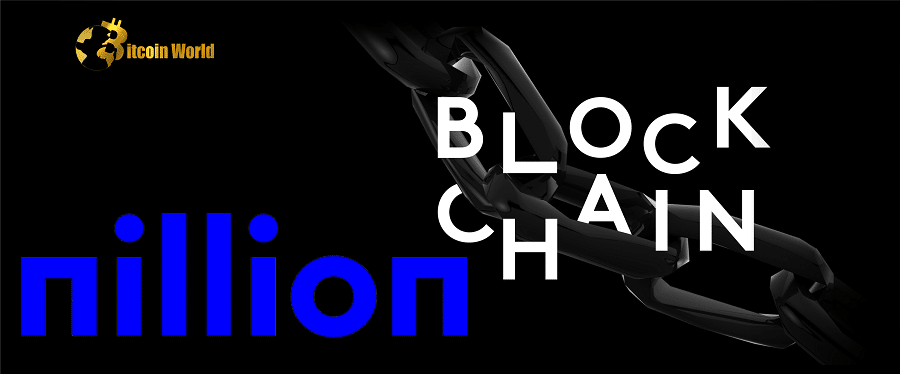Decentralization. It’s a buzzword you’ve likely heard countless times, especially if you’re in the crypto space. Blockchain technology kickstarted this movement, promising a world free from central control and brimming with possibilities like cryptocurrencies, NFTs, and DeFi. But what if decentralization could go even further, beyond the limitations of blockchain itself?
Could Decentralization Exist Without Blockchain? Enter Nillion and NMC
That’s the question Nillion, a cryptography-focused internet infrastructure platform, is tackling head-on. They’ve developed a groundbreaking technology called Nil Message Compute (NMC) that’s shaking up how we think about data storage, processing, and distribution. According to Nillion’s CEO, Alex Page, successful decentralization doesn’t necessarily hinge on blockchains. This NMC technology could redefine decentralization for businesses and individuals alike.
How Does Decentralization Work Without Blockchain?
Intrigued? Let’s break down how Nillion’s NMC technology achieves decentralization differently. In an interview with Cointelegraph, Alex Page explained the core concept:
“NMC-based technology takes any data, transforms it, and breaks it into pieces. These pieces are then distributed across various nodes in a network.”
Think of it like this:
- Data Transformation: Your data isn’t stored in its original form. It’s encrypted and transformed into unrecognizable particles.
- Data Fragmentation: These particles are then scattered across a network of independent nodes.
- Independent Computation: Nodes can perform computations on these data particles without needing to communicate with each other.
- Secure Reconstruction: The results are sent to a designated endpoint for reconstruction, without relying on trusted hardware.
This process is remarkably efficient and secure. As Page highlighted, “During the whole process, nodes are oblivious to the actual data they are working on, yet they can perform computations at speeds often exceeding its predecessor, multi-party computation, or MPC.”
NMC vs. MPC: What’s the Difference?
If you’re familiar with Multi-Party Computation (MPC), you might be wondering how NMC differs. Page clarifies the key distinction:
“In traditional MPC systems, nodes must communicate with each other, which significantly slows down computation speed. NMC eliminates this bottleneck, enabling fast, scalable computation. The outcome is a non-blockchain network of nodes capable of executing secure, private computations with remarkable speed and efficiency. This opens up exciting new use cases that go beyond the realm of blockchain.”
Here’s a simple table summarizing the key differences:
| Feature | Multi-Party Computation (MPC) | Nil Message Compute (NMC) |
|---|---|---|
| Node Communication | Nodes communicate with each other during computation. | Nodes operate independently without inter-node communication. |
| Computation Speed | Slower due to communication overhead. | Faster, scalable computation. |
| Technology Basis | Predecessor technology. | New, advanced cryptography-based technology. |
| Blockchain Dependence | Can be used in blockchain contexts but not inherently separate from blockchain. | Designed to function independently of blockchain. |
The Future of Decentralization: Beyond Blockchain’s Boundaries
Why is decentralization so crucial? Page emphasizes the growing importance of data and data control in our digital lives. He believes decentralization’s future hinges on adopting technologies that enhance blockchain’s utility and functionality, citing zero-knowledge proofs, succinctness proofs, thresholds, and smart contracts as examples.
However, he also points out a crucial nuance: “Decentralisation is a spectrum with multiple axes.” Blockchain is foundational, but other technologies are expanding the possibilities in ways blockchain wasn’t originally designed for.
Benefits of Decentralization Without Blockchain: Speed and Flexibility
Miguel de Vega, Nillion’s chief scientist, highlights the practical advantages of NMC technology, particularly its independence from blockchain’s inherent limitations. NMC doesn’t require synchronization with block production or wait for computation completion to be included in a block, unlike traditional blockchain-based computations.
“Instead, it can run when it’s needed, which is better for the user. Also, a computation can be any size because it doesn’t have to fit into a block.”
This on-demand, size-agnostic computation capability offers significant flexibility and speed advantages.
Decentralization in the Mainstream: A Growing Trend
The future trajectory of decentralized technologies is still unfolding. Competing platforms, regulations, and adoption hurdles create a complex landscape. Yet, the core idea of decentralization is resonating more strongly in mainstream conversations. Elon Musk’s acquisition of Twitter, for example, reignited discussions about the drawbacks of centralized platforms and sparked renewed interest in decentralized social media alternatives.
People are drawn to decentralization because it promises:
- Greater Transparency and Openness
- Reduced Reliance on Central Authorities
- Enhanced Control Over Personal Data and Assets
The explosive growth of cryptocurrencies is a testament to the appeal of these principles, or at least the promise of decentralization they represent.
Conclusion: Embracing a Broader Vision of Decentralization
While blockchain has been instrumental in popularizing decentralization, technologies like Nillion’s NMC are demonstrating that decentralization’s potential extends far beyond blockchain’s boundaries. By offering faster, more scalable, and flexible solutions, these innovations are paving the way for a truly decentralized future, one where data privacy, security, and user control are paramount. As we move forward, embracing this broader vision of decentralization, encompassing diverse technological approaches, will be key to unlocking the full transformative power of a truly decentralized digital world.
Disclaimer: The information provided is not trading advice, Bitcoinworld.co.in holds no liability for any investments made based on the information provided on this page. We strongly recommend independent research and/or consultation with a qualified professional before making any investment decisions.




